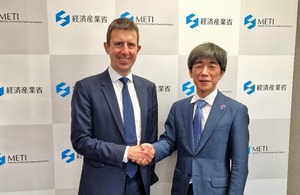UK-Japan Industrial Strategy Partnership Update
The UK and Japan announce first tranche of activity under our Industrial Strategy Partnership.

DBT Permanent Secretary Gareth Davies and Japan’s Ministry for Economy Trade and Industry Vice-Minister for International Affairs Matsuo Takehiko
During a meeting today [September 29] UK Department for Business and Trade Permanent Secretary Gareth Davies and Japan’s Ministry for Economy Trade and Industry Vice-Minister for International Affairs Matsuo Takehiko confirmed the main areas and directions to be addressed in a workplan for the UK-Japan Industrial Strategy Partnership, and announced a first tranche of activity under this partnership to sustain collaboration, including support for investment in each other’s economies.
Work towards a UK-Japan Industrial Strategy Partnership was announced in March 2025 at the 2nd UK-Japan Strategic Economic Policy and Trade Dialogue, during the visit to Japan by UK Secretary of State for Business and Trade. With today’s announcement, the UK and Japan have formalised the details of this partnership and confirmed a first tranche of planned activities to take place under the partnership in sectors including:
-
Advanced Manufacturing, Automotive – Recognising the close links between the UK and Japanese automotive sectors, as well as joint interests in industrial strategy, economic security and future automotive technologies, Mr. Davies and Mr. Matsuo reaffirmed the benefits of a holding a regular in-depth dialogue on automotive between relevant senior officials (the “Japan-UK Automotive Dialogue”). This first Dialogue occurred in May this year. The second – due to occur in early 2026 - will focus on supporting growth in our respective automotive sectors and identifying further routes to collaboration, including on batteries, other technologies and non-price criteria.
-
Clean Energy – Acknowledging our shared commitment to energy and climate goals, Mr. Davies and Mr. Matsuo underlined the importance of enhancing cooperation through various channels, including UK-Japan Energy and Climate Dialogue, and in various areas, including offshore wind and nuclear, with an emphasis on emissions reduction, energy security and economic growth.
-
Life Sciences – With the aim of enhancing research and development and commercial collaboration in both countries’ world-class life sciences sectors, and to drive economic growth through exports and investment, Mr. Matsuo and Mr. Davies committed to discussing the potential for further trade missions and visits.
-
Quantum – Mr. Davies and Mr. Matsuo committed to advancing the UK–Japan Quantum Memorandum of Cooperation by strengthening collaboration between our national quantum computing flagship facilities, promoting business and research engagement to drive sector growth and resilient supply chains, and convening UK and Japanese industry and investors at key events around the world to build commercial partnerships.
-
Cyber – Mr. Davies and Mr. Matsuo reiterated the importance of the UK-Japan Cyber Partnership and the Memorandum of Cooperation between the National Cyber Advisory Board of the United Kingdom and Keidanren on Public-Private Partnerships in Cyber. They acknowledged that good cyber security drives economic growth and committed to deepening exchanges on cyber skills development, accelerating public-private partnerships and working towards a streamlined approach to Internet of Things security.
Mr. Davies and Mr. Matsuo also discussed the important links between economic security and industrial strategy. In this regard, Mr. Davies and Mr. Matsuo reaffirmed their concerns regarding non-market policies and practices, including harmful industrial subsidies, market-distorting practices by state-owned enterprises (SOEs), and forced technology transfer, as well as the resulting harmful excess capacity and other market distortions. They emphasised the importance of collaborating with like-minded countries to build resilient and reliable supply chains. Furthermore, they reiterated to continue exploring non-price criteria in demand-side policy tools that take into account not only economic factors but also those related to the Principles on Resilient and Reliable Supply Chains, which were endorsed at the G7 Summit in June 2024.
The UK and Japan also confirmed their intention to cooperate in sectors including trade digitalisation, digital and technologies, space and defence industries, and creative industries. To ensure focus on delivery, Mr. Matsuo and Mr. Davies confirmed that the next UK-Japan Strategic Economic Policy and Trade Dialogue would be used to assess progress on these areas, as well as to identify the second tranche of activity to be conducted under the partnership.
During their meeting, Mr. Davies and Mr. Matsuo reaffirmed their intention to ensure the partnership remains firmly focused on delivering tangible benefits for businesses in both nations.